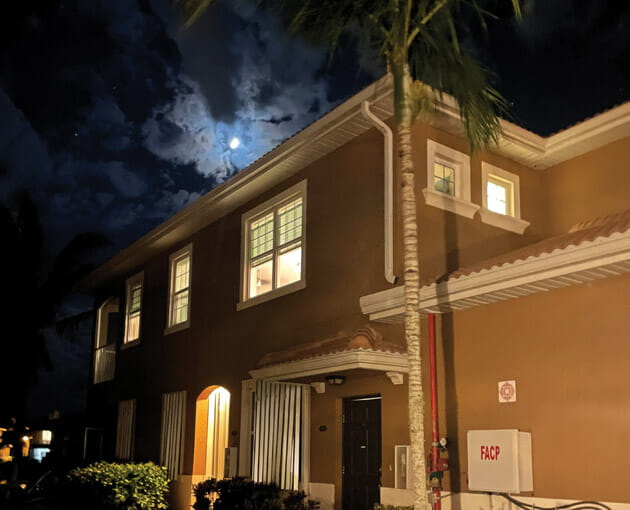At six o’clock on Tuesday, the traffic wasn’t any different. The same intersections were congested. The sky became slightly grayer as the clouds started to roll in. The tree branches were gently swaying, the only indication that there was even a breeze. The storm predictions assured us that Sarasota or Tampa would get the direct hit and Lee County would feel the outer bands. Mandatory evacuations were announced, but not many were taking them seriously. A sense of complacency was palpable.
As a law enforcement front-line supervisor for Lee County’s largest city, Cape Coral, I reminded the eight officers assigned to me to wash their uniforms, charge their equipment, and top off their patrol cars with fuel. Despite the preparations, we couldn’t truly be ready for what was a mere 24 hours away.
I had to rely on my faith and trust that God’s hand and provision would be on us.
Wednesday morning began with the report of someone who had taken their life. As I responded to the scene, the winds were approaching 35mph, and my patrol vehicle was blown from lane to lane on the roadway. The rain was picking up, and tree limbs were already falling on the streets, making the roads dangerous to travel. As I returned to our friend’s home, where my family would ride out the storm, the notification came over the radio that we had reached 45mph sustained winds, and all emergency services would cease for the duration of the storm.
The police radio became eerily quiet. I received a phone call informing me that our police radios were failing, and the backup system was instated. This was one of the last calls I would receive for the next 18 hours. Text messages were no longer going through. With the loss of communication through normal methods, we waited in silence. The eye of the storm passed over where we were staying in northwest Cape Coral. Witnessing 150mph sustained winds relocate outdoor furniture, tear down trees, rip pool cages from homes, and take apart roofs shingle-by-shingle was terrifying—the question of when it would end lingered across the hours.
Thursday, I woke up early to be at the police station by 5:30AM, looking forward to a shower before my shift started. As I traveled at 40mph through complete blackness—the only light from my headlights—I nearly ran into some downed power lines. Miles of knocked down and snapped power poles were the new landscape. I maneuvered around remnants of fences, pool cages, and roofs littering the roadway and arrived at the station to learn that the hurricane had knocked out the city’s power grid and damaged one of the city’s main water lines as well. The entire city was without water, making showers and toilets inoperable. Most cell phone towers were damaged, leaving us in a virtual communication blackout. Imagine a city of 220,000 people with no power, water, or way to communicate.
Citizens don’t often consider that officers’ homes also experience damage; some were destroyed, and others lost cars and personal property to flooding. They weren’t even able to address their own problems right away because they were doing their jobs assisting the public. My shift worked 16 days straight after Hurricane Ian. We directed traffic at intersections, protected businesses from further looting, responded to calls for service, and tried to assist each other the best we could. That first week a daily shift was no less than 14 hours. As other people removed shutters, tarped roofs, and cleaned yards, our own homes were neglected. Officers were doing what they could to get their families to safety and a place with power and water—making their days even longer as they drove to Tampa or Miami to deliver their families to hotels or load them on planes to be with family.
The streets that officers had traveled just days before were now unpassable due to the destruction. Missing street signs, traffic signals, and stop signs made it hard to navigate safely. Beautiful homes with manicured lawns were now littered with debris and the ever-growing pile of personal belongings which had been destroyed by the storm. Residential streets now looked like war zones.
After staying with our friends for a few days, I began traveling back and forth from my home in Fort Myers. The contrast between the two cities was stark. Going home at night, I saw lights, open businesses, and gas stations with barely a line. But when I navigated back to Cape Coral in the mornings, I saw only darkness. It appeared to those in Cape Coral that there was no hope. Most people didn’t have electricity until seven or eight days after the storm. I continued to remind my officers that there was hope even though it couldn’t be seen yet. Relief was coming; they needed only to be patient and keep going.
As law enforcement officers, we see the side of society that is often unexplored or ignored. The hopelessness, despair, and destruction create spiritual darkness. As a supervisor in this field, I know God has entrusted these officers to me. My priority during the storm’s aftermath was to ensure they were taken care of and supported—that the physical manifestation of the hopelessness, despair, and destruction did not over- whelm them. I needed to take care of them so they could care for the citizens. In much the same way, God cares for us, provides for us, and shows us the glimmer of His light amid overwhelming darkness, enabling us to offer hope to others.
by Law Enforcement Officer J. Carson





